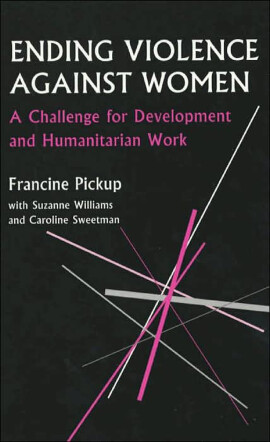
Ending Violence Against Women
A challenge for development and humanitarian work
Francine Pickup, Suzanne Williams, Caroline Sweetman
Violence and women’s fear of it limits women’s choices in virtually all spheres of life. It has long-term as well as short-term consequences on women’s physical and emotional well-being. It detrimentally affects women’s ability to gain an education, earn a livelihood, develop human relationships and participate in public activities, including development programmes. In this book addressing violence against women development workers go to the heart of how members of communities relate to one another and how they are able to shape their own lives. The first section of the book examines the many different definitions of violence against woman and offers theories about why it happens in all societies across the world. It discusses the current momentum around the issue and asks why development organizations have been slow to take up the struggle to end violence against woman. The second section focuses on strategies to counter violence against women and support the survivors. Case studies come from times of peace and times of armed conflict. Sections suggest strategies for transforming attitudes and beliefs in different societies that condone such violence, for supporting individual survivors and to ensure that governments and NGOs fulfil their duty to protect women.
Published: 2000
Pages: 390
Paperback: 9780855984380
| Preface | |||
|---|---|---|---|
| Introduction | |||
| Part 1: Exploring violence against women | |||
| 1. Explaining violence against women as a development concern Defining violence against women; The causes and the perpetrators; Poverty and violence against women: exporing the link; Some useful concepts from gender and development; Supporting women's empowerment and avoiding violent backlash; Summary and implications for development organisations | |||
| 2. Human rights and development responses to violence against women Human rights approaches to violence against women; An integrated response: human rights and development; Summary and implications for development organisations | |||
| 3. The prevalence, forms, and impacts of violence against women Problems in estimating the prevalence of violence against women; Forms of violence against women; The impact of violence upon women; Summary and implications for development organisations | |||
| 4. The contexts in which violence against women occurs Violence and social institutions; Violence against women in times of change and crisis; Summary and implications for development organisations | |||
| Part 2: Strategies for challenging violence against women | |||
| 5. Direct support to the survivors of violence What are the options available to women?; Creating a safe space; Supporting women's access to law and justice; Supporting women to overcome the mental and physical impacts of violence; Long-tern strategies: creating a livelihood; The right to individual petition under the Women's Convention; Planning support interventions for women survivors of violence; Summary and implications for development organisations | |||
| 6. Challenges to violent men Why work with male perpetrators?; Direct challenges to violent men; Ending violence through fostering women's empowerment; 'Healing the abuser;: working with male perpetrators; Summary and implications for development organisations | |||
| 7. Challenging attitudes and beliefs Raising awareness and ending stigma; Challenging attitudes by recording violence against women; Challenging attitudes by harnessing the media; Challenging attitudes through public education and information campaigns; Group work to build 'critical consciousness' of violence against women; Summart and implications for development organisations | |||
| 8. Challenging the State Strengthening legal responses to violence against women; Building the capacity of state workers to challenge violence; Achieving attitudinal change at the level of the State; Strengthening state provision of health and welfare; Lobbying for state provision of shelters; Transforming state-instigated research; Training of state officials; State involvement in education campaigns; NGO lobbying of governments to effect change; Summary and implications for development organisations | |||
| 9. Conclusion: planning for freedom from violence A rights-based approach to development; Strategies for tackling violence against women; Indentifying trends; Policy implications for international NGOs; Ending violence against women? | |||
| Appendix 1 The three phases of Rape Trauma Syndrome | |||
| Appendix 2 The KwaZulu Natal programme for the Survivors of Violence framework for understanding the effects of political violence and responding to it | |||
| Notes | |||
| Bibliography | |||
| Index |
Francine Pickup
Francine Pickup worked for several years as a researcher in Oxfam's Policy Department . She has also worked for Amnesty International.
Suzanne Williams
Suzanne Williams is an independent Social Development Consultant with Goukamma Consulting, having worked for Oxfam GB from 1977 to 2004. She was one of Oxfam's pioneers of work on gender equality and violence against women, and authored and co-authored several key publications and articles for Oxfam GB on these issues.
Caroline Sweetman
Caroline Sweetman is Editor of the international journal Gender & Development and works for Oxfam GB.





